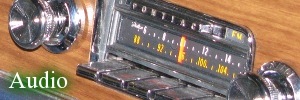















Californian Drivers Feel the Pain of Higher Gas Prices |
|---|

|
By Mike O'Sullivan
Los Angeles, California
May 20, 2004
Audio Version 456KB RealPlayer
With the New York commodity market price for oil at more than $40 a barrel, gasoline has reached record prices throughout the United States. The pain is being felt most strongly in California.
The national price of gasoline averages just over 53 cents per liter or $2 a gallon. It's more than 10 percent higher in California because the state has stringent requirements on fuel emissions, which make the processing of petroleum more expensive. Fifty cents a liter for gas would be a dream in many countries, where the cost is double that. But California driver Nver Dilanian, who spends a lot of time in her car, is getting angry. "I don't like it. I don't like it at all. It's ridiculous. It's outrageous," she said.
California driver Jayne Vicens agrees that gas is too expensive. "If there are seven days in a week, I'm at the gas station at least three or four days now because of the back and forth with my kids, going back and forth to school, the grocery store," she said. "It's really killing me."
One reason the hike hits hard in Los Angeles is the lack of good public transportation. Another reason: many Californians, who drive long distances, own oversized sport utility vehicles.
"What do I drive? I drive a Ford Bronco," says a driver. It costs him $50 each time he fills his gas tank.
This driver agrees that the price of gas is "outrageous." "However, I haven't changed my driving habits yet. But every time I fill up at the pump, it hurts more and more," says another driver.
California truckers have taken some action. They blocked a Los Angeles freeway for several hours recently to protest the rising cost of diesel fuel. This trucker says he and other commercial drivers are losing money. "We're not making it any more. It's too expensive for us to keep working," he said.
In Washington, Democratic senators are urging President Bush to release millions of barrels of oil from the U.S. Strategic Petroleum Reserve.
And in California, a bipartisan state commission is studying the oil market to see if the industry is pushing up retail prices. This driver is skeptical that the commission will change anything.
"It just seems that the government always likes to do investigations, but they never seem to come up with any solid answers as to why they [prices] keep going up. And I don't think they have any control over it. That's my opinion," he says.
Owners of several resorts in the mountain town of Big Bear are offering a free tank of gas to hotel guests.
They may not need to do that, according to several studies on the travel plans of Americans, which say people are planning more travel for the coming summer season despite the higher costs.
A survey by the American Automobile Association says more than 30 million Americans will travel on the Memorial Day weekend in late May. Allen Kay of the Travel Industry Association of America says his group has also found that people are tired of staying at home, as some have done since the terror attacks of September 2001.
"There is a great pent-up demand for travel," he said. "There are a lot of people who have put off trips that they have wanted to take, and they're ready to go. And they don't want to put those plans off any longer. And that holds for travel by car, by plane, no matter the mode." He adds that there is a growing sense of optimism about the economy.
This man says he's not driving any less today, but the rising cost of gas may fuel some changes. "I'm thinking about buying a new car, and I'm thinking about buying something that's fuel efficient," he said.
California state officials note that gasoline costs have been higher in the past, adjusted for inflation. They say in 1981, the inflation-adjusted price of gas was nearly three cents a liter higher than the cost today.
